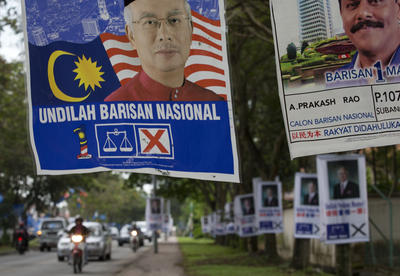The ‘political tsunami’ of 2008 proved the BN’s vulnerability. Five years on, the latest race is either side’s to win or lose.
Both the BN and the PR have been riven by factional struggles. The competition for seats is fierce as neither side has the luxury of assured dominance. The BN in particular has been beset by a series of financial scandals, and a number of those affected have been conspicuously replaced by untainted ‘new faces’. Even as the economy grows there is widespread angst over rising economic inequality and the soaring cost of living. A massive program of cash handouts and subsidies will help soothe some of those anxieties, but has been disparaged as little more than coffer-draining vote buying. On the other hand the PR — formed officially only after the 2008 elections, although the component parties have cooperated formally or informally for a while — is finding collective decision-making fraught with difficulty even as it sets aside real ideological and policy differences.
Three dimensions stand out as especially worth watching in the current campaign.
First, it is unclear who will actually vote at the election, and how. Of Malaysia’s 13.3 million registered voters an estimated 1 million live overseas, as many as half in Singapore. Due in part to new rules — not least in response to the massive ‘Bersih’ (Clean) campaign for electoral reform — Malaysians resident overseas may vote in person or by post (though only around 3,000 have registered for the postal option). A grassroots campaign is rallying the hundreds of thousands of Malaysians in Singapore and other nearby countries to balik undi, or go home to vote. Malaysian carrier AirAsia is even offering discounted fares to Malaysian voters joining the pilgrimage.
About one-fourth of voters are first-time voters — the largest surge in new registrants in Malaysian electoral history. While turnout was a creditable 76 per cent in 2008, Bersih leaders in particular are urging Malaysians to raise that to 85 percent or higher. Revelations, disseminated primarily by PR-linked investigators, of serious problems with the electoral rolls have raised concerns that ‘fake’ voters could sway the outcome.
All this makes predicting the outcome nearly impossible — if 100,000 Malaysians really do swarm over from Singapore to cast their ballots, results will change. Moreover, the impact of ‘new’ media — from online news sites, which offer very different information and perspectives to the sycophantic mainstream media, to Facebook (half of all Malaysians have accounts) — is all the greater when voters outside Malaysia are factored in.
Second, these elections bring questions of national identity to the fore. The state of Sabah was the site of a recent incursion by armed emissaries of the Sulu sultanate in the southern Philippines, which still claims that territory. But it is also the site of substantial flows of undocumented migrants, many who were purportedly granted easy citizenship so they can vote for the BN. Sabah is also home to the aggressive Sabah-for-Sabahans movement, which is angry at the state’s marginalisation under a peninsula-centric government. If states’ rights candidates are successful, Malaysia’s federalist project would appear to be in doubt. Moreover, these state-based anxieties find echoes in race-based concerns: pivotal to the BN’s decline in 2008 was the exodus of ethnic Chinese and Indian voters, who felt themselves to be second-class citizens in the Malay-dominated polity. While the Indian vote seems to be tilting back toward the BN, Chinese Malaysians still shun the BN. These elections will offer insight into how inclusive and cohesive the nation — Najib’s much-touted ‘1Malaysia’ — really is.
Lastly, this election is a two-party election (the BN is registered as a single party; the PR functions as one). Nominations, campaigning and elections can be expected to proceed differently from when the polity was truly dominated by one party. If nothing else, the BN has been obliged to make a real effort: it has made populist promises, risked bruised feelings by purging the candidate list of overly corrupt or contentious party divas, and struggled, like the PR, to control factional rivalries in order to nominate the most attractive candidates. Both coalitions have been forced to articulate clear policy agendas, and even if the usual communal and monetary inducements will still have a large bearing on results neither side is taking victory for granted.
Meredith L. Weiss is Associate Professor of Political Science at the University at Albany, State University of New York. She is part of a team, funded partly by the ANU’s Centre for Democratic Institutions and including the ANU’s Edward Aspinall and Paul Hutchcroft, researching elections in Southeast Asia.

